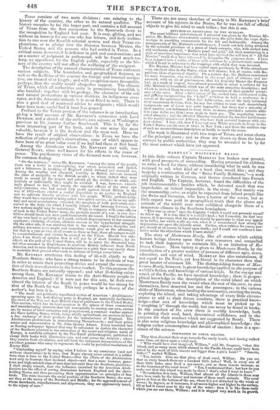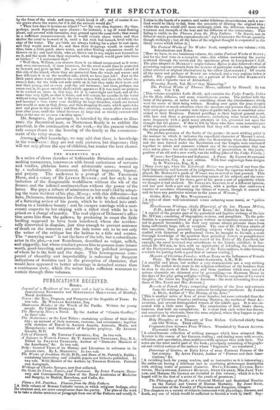MARRIAT'S MASTERMAN READY.
IN this little volume Captain MARRYAT has broken new ground, with good prospects of succeeding. Having promised his children to write a book for them, without considering what he said, he was reduced to ask what kind of a book they would like ; and they bespoke a continuation of the "Swiss Family Robinson,"—a work originally written in German, and thence translated into French and English. The Captain, however, found the difficulties of the job insurmountable ; besides which, he detected much that was improbable, or indeed impossible, in the story. Not merely was the seamanship outre, as might be expected from inland people like the Swiss and Germans, who have a horror of the ocean, but so little regard was paid to geographical truth that the plants and animals of the torrid zone were exhibited alongside those of a temperate climate in the Southern hemisphere. "This was an error," says the Captain, "which I could not persuade myself to follow up. It is true that it is a child's book ; but I consider, for that very reason, it is necessary that the author should be particular in what may appear to be trifles, but which really are not, when it is remembered how strong the impressions are upon the juvenile mind. Fiction, when written for young people, should at all events be based upon truth ; and I could not continue a narrative under the objections which I have stated."
The story of Masterman Ready, like all stories which exhibit human beings thrown upon their own resources and compelled to task their ingenuity to maintain life, is an imitation of Robinson Crusoe. More variety is given to Masterntan Ready, by the introduction of a greater number of persons of different ages, sexes, education, and cast of mind. MARRYAT has also naturalness, if not equal to DE FOE'S, yet less literal in its character than that great master of common life. The distinguishing feature of Masterman Ready, however, is great knowledge applied to the purpose of a child's fiction, and knowledge of various kinds. In the voyage and wreck of the Pacific, we have nautical knowledge ; there is geographical knowledge in the description of the coral island on which Masterman Ready runs the vessel when the rest of the crew, to save themselves, have deserted her and the passengers; in the various shifts of Masterman, when landing the necessaries, erecting the tents, exploring the island, and taking advantage of every little circumstance to add to their future comforts, there is practical knowledge—that sort of knowledge which must be picked up in "roughing it" through the world, but can never be found in books. In the conduct of the crew there is worldly knowledge, both in painting their cool, hard, determined selfishness, and in the excuses for their conduct which are suggested by Ready. There is also some religious knowledge and philosophical knowledge ; the religion rather commonplace and devoid of unction : here is a specimen of the science.
FORMATION OF CORAL ISLANDS.
They then directed their steps towards the sandy beach, and having walked some time, sat down upon a coral rock.
"Who would have ever imagined, William," said Mr. Seagrave, "that this island, and so many more which abound in the Pacific Ocean, could have been raised by the work of little insects not bigger than a pin's head?" "Insects, father!" replied William.
"Yes, insects. Give me that piece of dead coral, 'William. Do you see that on every branch there are a hundred little holes ? Well, in every one of these little holes once lived a sea-insect; and as these insects increase, so do the branches of the coral-trees." "Yea, I understand that ; but how do you make out that this island was made by them ? that's what I want to know.' "Nevertheless Nevertheless it is true, William, that almost all the islands in these seas have been made by the labour and increase of these small animals. The coral grows at first at the bottom of the sea, where it is not disturbed by the winds or waves; by degrees, as it increases, it advances higher and higher to the surface, till at last it comes near to the top of the water : then it is like those reefs which you see out there, William; and it is stopped very much in its growth
by the force of the winds and waves, which break it off; and of course it never grows above the water, for if it did the animals would die."
"-Then how does it become an island ?"—" By very slow degrees; the time, perhaps, much depending upon chance : for instance, a leg of wood floating about, and covered with barnacles, may ground upon the coral redo; that would be a sufficient commencement, for it would remain above water, and then shelter the coral to leeward of it, until a flat rock had formed, level with the edge of the water. The sea-birds are always looking for a place to rest upon, and they would soon find it; and then their droppings would, in course of time, form a little patch above water, and other floating substances would be thrown on it ; and land-birds, who are blown out to sea, might rest themselves on it, and the seeds from their stomachs, when dropped, would grow into trees or bushes." " I understand that."
"Well then, William, you observe there is an island commenced as it were; and, once commenced, it soon increases, for the coral would then be protected to leeward, and grow up fast. Do you observe how the coral-reefs extend at this side of the island, where they are protected from the winds and waves ; and bow different it is on the weather-side, which we have just left ? Just so the little patch above water protects the corals to leeward, and there the island increases fast ; for the birds not only settle on it, but they make their nests and rear their young, and so every year the soil increases : and then, perhaps, one
iii n its great outside shell (which appears as if it was made on purpose to be washed on shore in this way, for it is water-tight and hard, and at the same time very light, so that it floats, and will remain for months in the water without being injured) at last is thrown on those little patches—it takes root, and becomes a tree, every year shedding its large branches, which are turned into mould as soon as they decay, and then dropping its nuts, which again take root and grow in this mould ; and thus they continue, season after season and year after year, until the island becomes as large and as thickly covered with trees as the one we are now dividing upon."
Mr. Seagrove, the passenger, is intended by the author to illustrate the theoretical man, as Masterman Ready is to exhibit the practical, in the continuation of the work,—for the present volume only comes down to the housing of the family at the commencement of the rainy season.
Amongother knowledge, we may add that there is knowledge in the wooT-cuts : they are not only pictures, but diagrams ; they will not only please the eye of children, but render the text clearer.



























 Previous page
Previous page